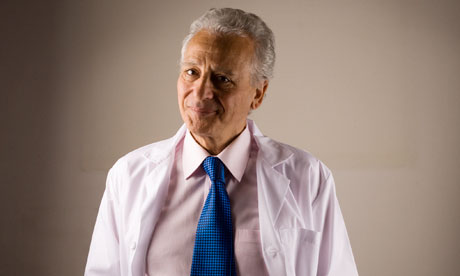
He is a diet guru to the rich, the famous and, it is said, even the royals. Dr Pierre Dukan, however, is not to the taste of fellow medics.
The French National Order of Doctors has lodged two official complaints against the inventor of the Dukan diet accusing him of breaking the medical code of practice and treating medicine "like a business".
Dukan's bestselling diet, published in 2000, has been translated into 14 languages and sold millions of copies worldwide, making the author a rich man and sparking an industry in Dukan diet products and a paid-for internet site dispensing weight-loss programmes and advice.
The celebrity doctor's peers, however, accuse him of not exercising enough care in his proposals, of engaging in personal promotion and of practising medicine "like a business", in contravention of the code.
They are also concerned about Dukan's recent suggestion there should be an "anti-obesity" test in the national baccalaureate – the single-exam equivalent of A-levels. He proposed that students whose weight remained within "normal" limits should be given extra marks in the exam. Doctors said this failed to take into account "possible repercussions on young girls who are already overweight or have a tendency towards anorexia".
Controversy has dogged the Dukan diet, credited with helping the Duchess of Cambridge and her mother, Carole Middleton, squeeze into their royal wedding frocks and with helping singer Jennifer Lopez regain her figure after pregnancy.
The invention of the strict, protein-rich weight loss programme has become the stuff of legend. Dukan, born in 1941 in Algeria, originally trained as a neurologist and was practising as a GP when a patient who had been advised to lose weight told him: "Prescribe whatever diet you want, stop me eating anything, but not meat. I can't do that." Dukan advised the patient to eat meat with as little fat as possible and drink lots of water. In five days the patient lost 5kg, and Dukan had found his medical calling and his fortune.
It took him a further 20 years to hone the diet, now believed to be followed by about 2 million French people. Dukan's website has almost 30,000 paying subscriptions and 50 food products branded "Dukan Diet" are sold in French supermarkets and chemists. The Dukan industry is estimated to be worth €100m (£84m) a year.
The latest complaints – one from the national medical body, the French equivalent of the British Medical Association, and one from the Paris branch of the organisation – follow accusations from doctors last year that the Dukan diet is a public health risk.
In May a survey of 5,000 "Dukanians", as they are called, found that 80% had regained the weight they lost within three years.
Experts who analysed the results expressed concern that the diet could increase the risk of diabetes and cardio-vascular diseases, including high blood pressure, as well as affecting liver and renal functions and fertility.
At the time Dukan rejected the criticism, saying his diet was normal and that being overweight was a greater health risk. "We doctors have to weigh the risks and the benefits. I consider the real risk is being overweight and obesity. Every day there are people who die from this and I am trying to fight against it," he told the daily paper Le Parisien.
Last year Dukan lost a libel action against a rival doctor, Jean-Michel Cohen, who promotes a calorie-counting and exercise diet. Cohen said only the "slimming industry, doctors, pill salesmen, publishers and newspapers" had really benefited from the Dukan diet, which he described as a "bandwagon of this fantasy".
The court made no judgment on the accusations on scientific or health grounds.
A spokeswoman for the order of doctors refused to comment on the legal action. She said the it focused on contraventions of the medical code of practice.
Dukan is on a tour of the US to promote his latest book of recipes. He has a month to submit his written defence to the CNOM's disciplinary council. If found guilty, he could be struck off.
As the headline in Libération read: the Order of Doctors cannot stomach the Dukan diet.
• This article was amended on 10 April 2012 because the original said: "Experts who analysed the results expressed concern that the diet could increase the risk of cardio-vascular diseases, including diabetes". Diabetes is not a cardio-vascular disease. This has been corrected.

